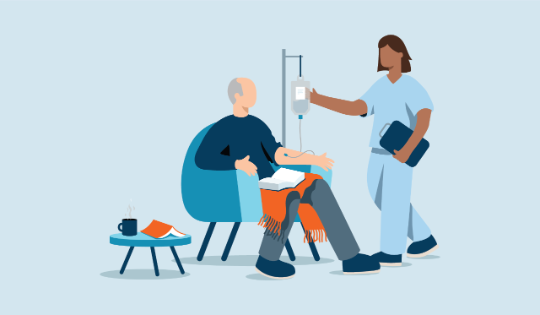

Clinical trial results for
bladder or urinary tract
cancer after surgery
To help prevent a type of bladder or urinary
tract cancer (urothelial carcinoma) from
coming back after it was removed by surgery


Clinical trial results for
bladder or urinary tract
cancer after surgery
To help prevent a type of bladder or urinary
tract cancer (urothelial carcinoma) from
coming back after it was removed by surgery
Actor portrayals.
Having surgery was an important step for you to take in treating your cancer, but to make sure your cancer doesn't return, your doctor may recommend adjuvant therapy. This is a type of treatment used after surgery to help prevent cancer from coming back by making sure no hidden or hard-to-see cells are left after surgery.
In a clinical trial of 709 people who had surgery to remove cancer in the lining of the bladder or urinary tract, 353 people were given OPDIVO and 356 people were given a placebo.
Half the people did not have their cancer return
Half the people did not have their cancer return
People given OPDIVO had a 30% lower risk of their cancer returning after surgery than those given placebo.
Overall survival benefit data is not available at this time.
OPDIVO will not work for everyone. Individual results may vary.
See your recommended treatment plan and what to expect from an infusion
For adults with a type of bladder or urinary tract cancer (urothelial carcinoma) to help prevent it from coming back after it was removed by surgery
OPDIVO® (nivolumab) is a prescription medicine used to treat adults with cancer of the lining of the urinary tract (including the bladder, ureters, or renal pelvis) [urothelial carcinoma] to help prevent cancer of the urinary tract from coming back after it was removed by surgery.
It is not known if OPDIVO is safe and effective in children younger than 12 years of age with melanoma or MSI-H or dMMR metastatic colorectal cancer.
It is not known if OPDIVO is safe and effective in children for the treatment of any other cancers.


